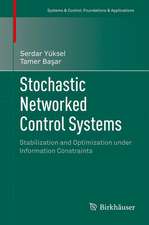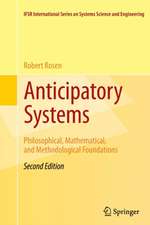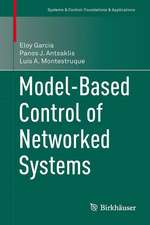Quantitative Modeling of Operational Risk in Finance and Banking Using Possibility Theory: Studies in Fuzziness and Soft Computing, cartea 331
Autor Arindam Chaudhuri, Soumya K. Ghoshen Limba Engleză Hardback – 6 noi 2015
| Toate formatele și edițiile | Preț | Express |
|---|---|---|
| Paperback (1) | 636.12 lei 6-8 săpt. | |
| Springer International Publishing – 23 aug 2016 | 636.12 lei 6-8 săpt. | |
| Hardback (1) | 642.18 lei 6-8 săpt. | |
| Springer International Publishing – 6 noi 2015 | 642.18 lei 6-8 săpt. |
Din seria Studies in Fuzziness and Soft Computing
- 20%
 Preț: 999.85 lei
Preț: 999.85 lei - 20%
 Preț: 653.06 lei
Preț: 653.06 lei - 20%
 Preț: 872.98 lei
Preț: 872.98 lei - 20%
 Preț: 930.57 lei
Preț: 930.57 lei - 20%
 Preț: 1051.00 lei
Preț: 1051.00 lei - 20%
 Preț: 992.44 lei
Preț: 992.44 lei - 20%
 Preț: 655.85 lei
Preț: 655.85 lei - 20%
 Preț: 1001.86 lei
Preț: 1001.86 lei - 18%
 Preț: 954.14 lei
Preț: 954.14 lei - 20%
 Preț: 330.10 lei
Preț: 330.10 lei - 20%
 Preț: 333.04 lei
Preț: 333.04 lei - 20%
 Preț: 997.56 lei
Preț: 997.56 lei -
 Preț: 391.61 lei
Preț: 391.61 lei - 20%
 Preț: 647.79 lei
Preț: 647.79 lei - 20%
 Preț: 986.01 lei
Preț: 986.01 lei - 18%
 Preț: 958.56 lei
Preț: 958.56 lei - 20%
 Preț: 996.40 lei
Preț: 996.40 lei - 20%
 Preț: 999.35 lei
Preț: 999.35 lei - 15%
 Preț: 646.43 lei
Preț: 646.43 lei - 20%
 Preț: 651.57 lei
Preț: 651.57 lei - 20%
 Preț: 997.89 lei
Preț: 997.89 lei - 15%
 Preț: 641.03 lei
Preț: 641.03 lei - 20%
 Preț: 1009.74 lei
Preț: 1009.74 lei - 20%
 Preț: 992.62 lei
Preț: 992.62 lei -
 Preț: 388.72 lei
Preț: 388.72 lei - 18%
 Preț: 1223.43 lei
Preț: 1223.43 lei - 20%
 Preț: 651.42 lei
Preț: 651.42 lei - 18%
 Preț: 951.59 lei
Preț: 951.59 lei - 18%
 Preț: 948.61 lei
Preț: 948.61 lei
Preț: 642.18 lei
Preț vechi: 755.51 lei
-15% Nou
Puncte Express: 963
Preț estimativ în valută:
122.89€ • 131.40$ • 102.46£
122.89€ • 131.40$ • 102.46£
Carte tipărită la comandă
Livrare economică 17 aprilie-01 mai
Preluare comenzi: 021 569.72.76
Specificații
ISBN-13: 9783319260372
ISBN-10: 3319260375
Pagini: 175
Ilustrații: XVI, 190 p.
Dimensiuni: 155 x 235 x 17 mm
Greutate: 0.47 kg
Ediția:1st ed. 2016
Editura: Springer International Publishing
Colecția Springer
Seria Studies in Fuzziness and Soft Computing
Locul publicării:Cham, Switzerland
ISBN-10: 3319260375
Pagini: 175
Ilustrații: XVI, 190 p.
Dimensiuni: 155 x 235 x 17 mm
Greutate: 0.47 kg
Ediția:1st ed. 2016
Editura: Springer International Publishing
Colecția Springer
Seria Studies in Fuzziness and Soft Computing
Locul publicării:Cham, Switzerland
Public țintă
ResearchCuprins
Introduction.- Operational Risk.- The g-and-h Distribution.- Probabilistic view of Operational Risk.- Possibility Theory for Operational Risk.- Possibilistic View of Operational Risk.- Simulation Results.- A case study: Iron ore Mining in India.- Evaluation of the Possibilistic Quantification of Operational Risk.- Summary and Future Research.
Textul de pe ultima copertă
This book offers a comprehensive guide to the modelling of operational risk using possibility theory. It provides a set of methods for measuring operational risks under a certain degree of vagueness and impreciseness, as encountered in real-life data. It shows how possibility theory and indeterminate uncertainty-encompassing degrees of belief can be applied in analysing the risk function, and describes the parametric g-and-h distribution associated with extreme value theory as an interesting candidate in this regard. The book offers a complete assessment of fuzzy methods for determining both value at risk (VaR) and subjective value at risk (SVaR), together with a stability estimation of VaR and SVaR. Based on the simulation studies and case studies reported on here, the possibilistic quantification of risk performs consistently better than the probabilistic model. Risk is evaluated by integrating two fuzzy techniques: the fuzzy analytic hierarchy process and the fuzzy extension of techniques for order preference by similarity to the ideal solution. Because of its specialized content, it is primarily intended for postgraduates and researchers with a basic knowledge of algebra and calculus, and can be used as reference guide for research-level courses on fuzzy sets, possibility theory and mathematical finance. The book also offers a useful source of information for banking and finance professionals investigating different risk-related aspects.
Caracteristici
Offers a comprehensive report on the modeling of operational risk using possibility theory Features a set of methods for analyzing operational risk using fuzzy set theory Presents advanced concepts in fuzzy sets, possibility theory and mathematical finance Includes supplementary material: sn.pub/extras












